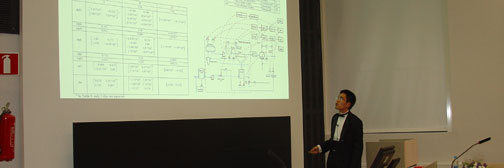| | Year 2011
Karhan ÖzdenkciFault Diagnosis of Large Scale Systems
This thesis investigates fault diagnosis of large-scale processes in accordance with characteristics of large-scale processes and practical suitability.
The literature part presents a background about typical fault diagnosis methods and diagnosis of large-scale processes. It is stated that the typical methods are insufficient for diagnosing large-scale processes. Those methods do not cover the ease in development, online computational requirement and adaptability issues of large-scale processes. Therefore, process decomposition plays a key role in diagnosis of large-scale processes.
Effective process decomposition should minimize the interactions among subsystems and maximize the interactions within each subsystem, thus providing effective fault isolation. Consequently, process decomposition-based strategies are introduced, namely top-down and bottom-up. However, all implemented methods under these strategies have severe practical challenges: the usage of single method for the whole process, weak detection, insufficient attention to process decomposition, and the fault modeling requirement.
The experimental part of this thesis investigates diagnosis of control loops, due to conflicting objective with diagnosis and process decomposition criteria. A method is proposed for diagnosis of interacting control loops. The proposed method aims to exclude the impact of variations of disturbance input variables from residuals and to distinguish all four types of faults (output sensor, actuator, disturbance sensor and process faults). It is concluded that the proposed method is very effective for interacting control loops.
The future strategy should address the different process natures of subsystems in a large process and minimize the fault modeling requirement. Such strategy can involve three steps to develop: process decomposition, constructing a diagnosis technique for each subsystem and combining the results.
This info last modified 27 Apr 2024 by Jerri Kämpe-Hellenius
|

